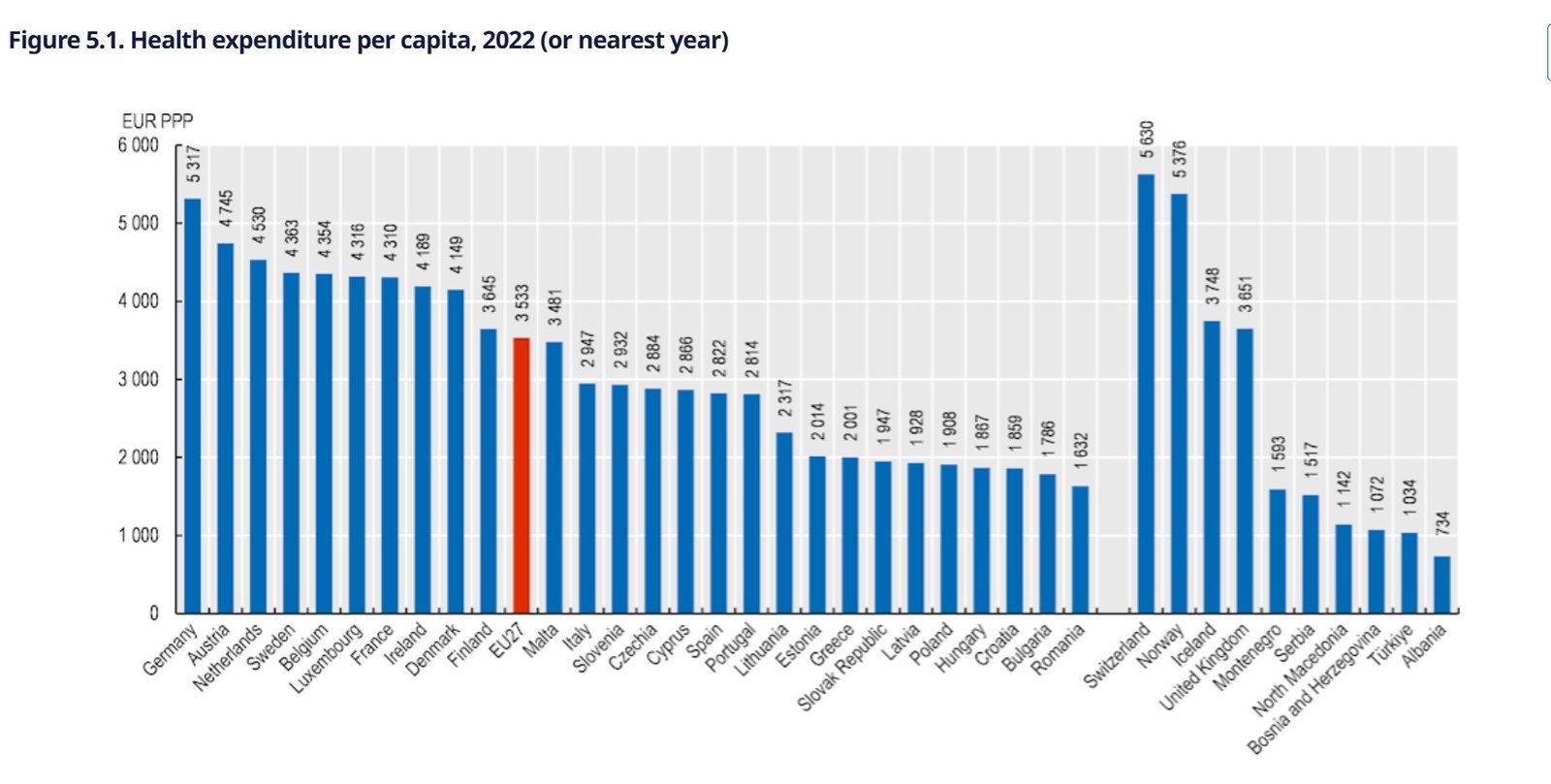Healthcare system in Portugal is facing serious challenges. Patients often wait hours in emergency rooms or for ambulances. Sadly some delays have led to deaths. One major reason for these issues is low healthcare spending of Portugal compared to other European countries.
Read More About: Rui Rocha Calls for INEM Leadership Resignations
Healthcare Spending In Portugal

The Health at a Glance Europe report by the OECD and European Commission highlights this problem. In 2022, Portugal’s healthcare spending per capita was 2814 euros significantly lower than the EU baseline of 3,533 euros.
Germany is at the top because they spent 5,317 euros per capita which is almost double of the Portugal’s spending. These numbers show how Portugal lags behind in funding healthcare.
Portugal’s Position Among EU Countries
Portugal ranks 17th in spending on healthcare among the member nations of EU. Germany, Austria, and the Netherlands spend the most on healthcare. While Romania, Bulgaria, and Croatia spend the least.
Portugal is not at the bottom but its spending is too low to meet growing demands. Overcrowded emergency rooms, long surgery waiting lists, and limited specialist access reflect these challenges. Portugal must allocate more funds to its healthcare system to improve.
Differences In Spending Across Europe
Healthcare spending varies greatly across Europe. Richer countries in Western and Northern Europe spend far more than poorer nations in Central and Eastern Europe. Germany spends five times more per person than Romania or Bulgaria for instance.
The OECD said:
This means that health spending in the high-income countries of Western and Northern Europe can be five times higher than in some low-spending countries in Central Europe
People benefit from better facilities , shorter waiting times, and advanced treatments in high spending countries. Low spending countries struggle to provide basic care. Portugal sits between these extremes and facing significant challenges due to its moderate spending.
Portuguese households bear a large share of healthcare costs. In 2022, families directly paid for 30% of healthcare expenses which is double the EU average of 15%. Portugal is one of a few countries with such a high burden alongside Lithuania, Latvia, Bulgaria, and Greece.
This creates financial strain especially for older people those with chronic illnesses and low income families. Many depend on private insurance or pay out of cash for services. Reducing this cost is vital to make healthcare equitable and more accessible.
The Pandemic’s Impact On Healthcare
During COVID-19, healthcare spending in Europe temporarily rose. Governments spent heavily on vaccines, testing, and hospital resources. EU spending grew by nearly 6% in 2020 and 10% in 2021.
OECD pointed out:
The average growth in healthcare spending reached almost 6% in real terms in 2020 and accelerated to 9.6% in 2021 across the EU
However, funds were focused on pandemic related needs while other services like cancer screenings were neglected. As a result, many health conditions are now diagnosed later which make treatment harder.
In Portugal, the pandemic exposed how unprepared the system was for both emergencies and routine care. Balancing priorities is essential to prevent similar issues.
Healthcare Spending After COVID-19
Healthcare expenditure in the EU dropped after the epidemic. In 2022, per capita spending grew by only 3.7% which is much less than during COVID-19. Preliminary data for 2023 suggests spending dropped further in about half of EU countries.
Portugal has also seen spending slow. Public hospitals face staff shortages, outdated equipment, and rising demand. These problems cause longer waiting times and reduced care quality. These issues will worsen without steady investment.
Portugal’s healthcare system needs urgent attention. Despite offering universal healthcare, underfunding threatens its quality and accessibility.
The government must raise its healthcare budget to at least the EU average. Funds should improve public hospitals, hire more staff, and update equipment. Reducing household costs through subsidies is also crucial.
Reforms should focus on efficiency, preventive care, and reducing reliance on private providers. Investing in preventive care can save costs over time. Portugal can build a better healthcare system for everyone with strong policies and investment.
Portugal’s low healthcare spending has serious effects. Long waiting times, high out of pocket costs, and staff shortages show the system is under strain. The pandemic highlighted these problems and spending cuts now risk making them worse.
The government must move rapidly to enhance healthcare budget. Improving healthcare is not simply about curing illnesses. It assures a healthier and more productive society. By addressing these issues, Portugal can provide better care for its citizens and strengthen its healthcare system for the future.





